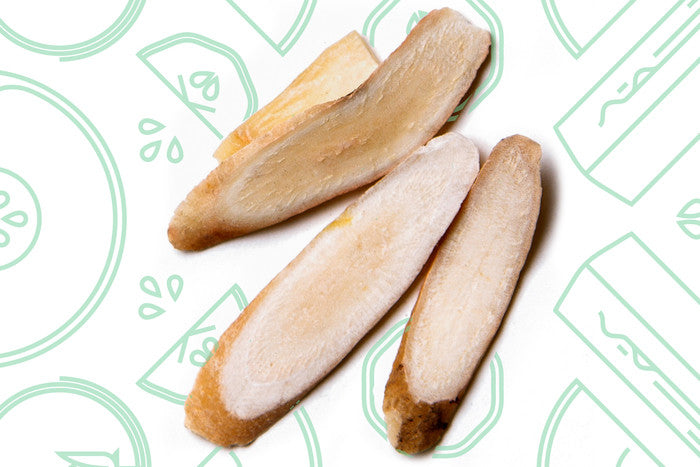A powerful herb that finds frequent mention in classic Traditional Chinese Medicine texts and cannons for its many wellness properties is Bai Shao, more commonly known as the White Peony Root. Scientifically called Paeonia Lactiflora Pall, it belongs to the Paeoniaceae family of flowering plants.
The “root” section of the peony is highly regarded by herbalists and Traditional Chinese Medicine practitioners for its emotional stabilizing and mental focus benefits (among other benefits, including supporting overall immune health as part of a balanced lifestyle).
In basic terms, it has the potential to make us feel good.

Origin, Flavor, and Uses of White Peony Root
The peony, or the shao yao plant, is not just cultivated for its beautiful flowers, but also for its medicinal roots. This herb is obtained by digging the roots of a 3-4 year old cultivated white peony plant in the summer and autumn, which is then washed and prepared in warm water and sun-dried..
The end result is a peeled root with a white to pink appearance, unlike the red peony root with its outer layer and red color intact.
The taste of the White Peony Root, like many Chinese herbs, ranges from bitter to sour to sweet. This health-giving root has been in cultivation since 900 BC, and is widely grown in the Zhejiang, Anhui, and Sichuan provinces of China. It is mostly consumed in the form of herbal teas or encapsulated as a supplement.
Harmonizing Support for Blood & Liver
The White Peony Root is best used as a tonic for blood and as a “heat reducing” (or “heat removing”) herb for the liver. Apart from nourishing the blood and neutralizing a hyperactive or stagnant liver Qi, according to Traditional Chinese Medicine methodology and theory, White Peony Root is traditionally used to support comfort and balance in the abdominal area and promote women’s wellness.
The benefits continue: It is traditionally believed to support the body’s natural cooling response and maintain internal balance.. Also, as per this study that was supported by the National Natural Science Foundation of China, it contains glycosides that have been studied for their potential to support immune system balance.
One Herb, Two Harmonizing Formulas

The benefits of the White Peony Root are so versatile that we’ve included this herb in three of our formulas: Emotional Balance, a powdered and flavored version inspired by (Xiao Yao San), Free & Easy Wander, and Four Substance (Si Wu Tang). Inspired by nearly 3,000 years of traditional use of White Peony Root, these two formulas are designed to support women’s overall wellness and vitality.
Four Substance boosts and replenishes energy (and, spoiler alert - you don't need to be a woman to appreciate this powerful formula, sometimes men need a little extra pep as well!). Emotional Balance and Free & Easy Wanderer are used in Traditional Chinese Medicine to promote emotional balance, support digestive comfort, and encourage overall vitality.

Powders and tablets can both work quickly, but traditionally, Chinese herbs have bitter flavor profiles that are not always well-received by an unaccustomed Western taste profile. One of DAO Labs' goals is a commitment to connecting everybody to this beautiful practice, along with bridging introductions to acupuncturists in their community. We've packaged the herbs so they can be incorporated into your busy lives, and given them names that say exactly what they do.
We'd love to have you try our formulas today, with our 100% Happiness Guarantee. Unleash the power and wisdom of Traditional Chinese herbs.
Care Consideration: Just a reminder that the above information is not a substitute for medical care and is not a substitute for medical advice or recommendations from a healthcare provider. This information is not intended to treat, mitigate, or cure any disease. That said, we encourage you to connect with an Acupuncturist in your community to learn more about this and other Traditional Chinese Medicine options. If you’ve got questions about Chinese herbal medicine or getting started with an Acupuncturist, feel free to connect with us at hello@mydaolabs.com.
















